- Home
- Kristin Harmel
When We Meet Again Page 2
When We Meet Again Read online
Page 2
CHAPTER TWO
* * *
My father arrived thirty minutes later, dressed in crisp charcoal pants, a pale blue shirt, and a gray tie. It appeared he’d just come from the office. He looked thinner than he had the last time I’d seen him, at my grandmother’s funeral in February, and I was struck by how much he’d aged. His hair had gone almost completely white, and the creases on his face were deeper than ever.
“Hi, sweetheart,” he said, gazing at me hopefully from the doorstep.
“Come in,” I said, turning away and walking toward the kitchen before he could try anything embarrassing like a hug.
My father lived in Orlando now too; he’d come here from Miami seven years ago, apparently in hopes of reestablishing a relationship with me. He’d even opened a branch of his firm, Emerson Capital Investments, on Orange Avenue downtown so that he’d have a reason to be close by. I wanted to be in Orlando more often so that we could have a shot at getting to know each other, he’d told me when he first called out of the blue. Since then he had telephoned dutifully every two weeks, but I almost always let his calls roll over to voice mail and deleted most of his messages without listening. After all, what was there to say?
He’d left my mother and me when I was eleven to marry a twenty-four-year-old assistant at his firm. Her name was Monica, and the first time I’d met her, I’d told her I hated her and that she had no right to break up my parents’ marriage. She, in turn, had told my father that she wanted nothing to do with a little brat like me, a sentiment he’d repeated to me apologetically a few weeks later when he explained why I wouldn’t be hearing from him much in the future. He’d moved to Miami before I finished seventh grade, and for the next decade—as long as Monica was in the picture—I had almost no contact with him. It was like he’d forgotten he had a child in the first place.
He tried to reconcile with me after their divorce, but as far as I was concerned, it was too late. Walking away from your child like that was unforgivable. It was made worse by the fact that he hadn’t come back in the wake of my mother’s death. I’d just turned eighteen when she died, so there was no custody issue involved, but he must have realized how alone I felt. Evidently, it hadn’t mattered. He’d called once, to tersely express his sympathy, and that had been it. Later, I’d felt like a fool for spending the next month hoping every time the doorbell rang that he’d be the one standing outside my house, waiting to make me his daughter again.
By the time he resurfaced, showing up outside the journalism building at the University of Florida during my senior year of college to beg for a second chance, my walls were already up. I’d learned by then that I couldn’t rely on anyone but myself. I’d never forgiven him for teaching me that lesson at such a young age. And although he’d spent the last several years apologizing profusely on my voice mail, explaining that walking away had been the biggest mistake of his life, the damage couldn’t be undone.
“I was so glad to get your call, Emily,” my father said now, closing the front door gently behind him and following me down the hall. “I know I have a lot to explain to you and a lot to make up for, but—”
I cut him off. “This isn’t a social visit,” I told him. “I received something that I need to ask you about.”
He looked crestfallen, but he nodded and ducked into the kitchen behind me. I gestured to the kitchen table, and when he saw the painting propped up there, he stopped short and stared. “Emily, what is this?”
“I think it’s Grandma Margaret.” I hesitated. “Isn’t it?”
Silently, he reached for the painting the same way I had an hour earlier. He traced the lines of his mother’s face, and when he looked up again, I was startled to see tears in his eyes. “Where did you get this?”
“It came from a gallery in Munich, Germany.” I handed him the note. “There’s no signature. I don’t know who sent it.”
His eyes widened as he scanned the small card. “ ‘I read your column, and you’re wrong,’ ” he read aloud. “ ‘Your grandfather never stopped loving her. Margaret was the love of his life.’ ” He looked up to meet my eye. “This is about your column from a couple months ago, the one where you talked about damage that trickles down through the generations.”
I turned away, suddenly guilty. “Yes.” I cleared my throat. “I guess I owe you an apology. I didn’t know you read my column.”
“Of course I do.” His tone was gentle and didn’t carry any of the blame I expected. “Every single one. And no apology needed. You were right about everything. I behaved abominably.”
“Right. Well, anyway.” I bit my lip and turned back to the painting, changing the subject. “How sure are you that this is actually Grandma Margaret?”
He looked at the painting for a moment. “I’m positive, actually. At the end of her life, she kept telling the same story over and over again. She kept saying that the day she met my father, she was wearing a red dress, and the sky was turning violet as the sun came up. Just like in this painting. It’s the exact scene she was describing.” He closed his eyes for a moment. “I always felt so sad that the person who’d hurt her the most was the person she was thinking about at the end, as her mind got foggier. It was the only time in my life I ever heard her voluntarily mention him.”
“She missed him,” I said softly, feeling a surge of guilt that I hadn’t spent much time with my grandmother in those final months. I’d been so busy with my career that I hadn’t made the time, and now I’d regret that forever. I looked back at the painting now, my eyes tracing the familiar lines of my grandmother’s face. “But what about the person who sent the painting? Do you think they know who your father is?”
“I don’t know how that could even be possible. My mother couldn’t explain what happened to him, but some stranger in Germany mysteriously knows our family secrets? It just doesn’t add up.”
“I know. But what if it’s true, though? What if Grandma Margaret really was the love of your father’s life?”
My father looked away. “And he just vanished? Never looked back? And now someone’s sending random, cryptic messages saying that he never stopped loving her?” He shook his head. “I’m afraid it’s unlikely.”
Something dark was simmering inside of me all of a sudden. “What’s unlikely? That he loved her but still managed to leave her behind?”
“Well, yeah. You don’t just walk away from the people you love like that.” He glanced at me, and suddenly, he seemed to realize what he’d just said. “Emily, I didn’t mean me and you. It’s not the same situation.”
I blinked a few times, any rapport between us gone in a flash. “Sure. Like father, like son, I guess.”
He waited until I met his gaze. “Emily, I’m sorry. I’m so sorry. There’s nothing I can ever say or do to change what I did.”
“Then why do you keep trying?” I hated the coldness in my voice, but it’s what I reverted to every time I talked with my father. It was just easier that way.
“Look, I left because of my own baggage, my own shortcomings. And I need to try to explain that to you. I need to make it up to you.”
“Please stop.” I felt suddenly exhausted. “I hear what you’re saying. But it doesn’t change anything.” I paused and looked down at my grandmother’s face.
“I know.” After a moment of silence, my father cleared his throat. “So what do you plan to do about the painting, Emily? What are you thinking?”
I took a deep breath. “I need to find out who sent it and what they know. I want to understand what happened.”
“I do too. And I’ll help you in any way I can.”
I turned away. “Thanks, but I can do this on my own.”
“Then why did you call me?” My father’s tone was gentle, but I felt defensive all the same.
“I don’t know. I thought you might know something that could help. But I guess I was wrong.”
My father turned to stare at the painting. “All I know,” he said after a while, “is that
I grew up without a father. And then I turned around and did the exact same thing to you.” He looked up and gave me a sad smile, and then, after giving my arm a quick squeeze, he headed for the door. “Believe me, I want to get to the bottom of this too.
“Emily,” he said, pausing at the threshold. “I’m glad you called.”
* * *
The phone rang the next morning just past six, jarring me out of a nightmare about my father and Monica standing at my mother’s grave, taunting me.
“This is Nicola Schubert of the Galerie Schubert-Balck in Munich,” said the heavily accented voice on the other end as soon as I picked up. “I am returning a call from Emily Emerson. You are Miss Emerson?”
“Yes, that’s right.” I was instantly awake as I reached for a notepad and pen.
“I do hope I am not calling too early. But I wanted to get back to you as soon as possible.”
“No problem,” I said quickly. “I was trying to reach you because I received a painting from your gallery and I—”
“Yes, yes,” Nicola interrupted. “I am aware. But I am afraid there is not much I can tell you. Of course The Girl in the Field with the Violet Sky is a beautiful painting.”
“The painting has a name?”
“No, no, it is just what we are calling it. It arrived with very few details.”
“But who sent it to you?” I asked. “And why?”
“That’s what I am trying to tell you. I truly do not know. It arrived by courier with a typewritten note.”
“Do you still have it?”
She snorted. “Surely not. I recycle. But I can tell you what it said. It said that money had already been wired to the gallery, and that it should be more than enough to pay for the restoration and the shipping—which it was. The letter said that the painting had been kept for many years in a room that was too damp, and the sender was concerned that before the painting was sent on, it should be restored to perfect condition. The sender also included a sealed envelope and asked me to include it with the painting. Perhaps the sender included some information there.”
“No,” I said with a sigh, thinking of the cryptic note. “Do you know where the painting was sent from? Another gallery in Munich?”
“To be honest, one of my assistants processed the paperwork. So I have no knowledge of the painting’s origin.”
“Could I speak with the assistant?”
“Bettina? I’m afraid she quit a month ago.”
“Is there any way to get in touch with her?” I could hear the desperation in my own voice. “I’d just like to ask if she remembers anything about where the painting came from.”
Nicola sighed. “I’m afraid that’s not possible. She didn’t leave us on good terms.”
I could almost feel each possible lead slipping away, one by one. “Do you have any idea why the painting was sent to your gallery specifically?”
“Because I am one of the foremost restoration specialists in the world for this type of art, obviously.” I could tell by her clipped tone that I’d offended her. “And clearly the sender was aware of my gallery’s reputation.”
“And you don’t know who the painter is?”
She hesitated. “No. I do not.” There was something in her voice that told me she knew more than she was saying, but before I could ask anything else, she continued, “Now, Miss Emerson, it is imperative that I return to my customers. I just wanted to give you the courtesy of a return call. I hope you enjoy the painting. It is very beautiful. I was struck by the skill of the artist’s brushwork, and I must say, I enjoyed the restoration.”
“Is there anything else you can tell me?”
“Do you know a lot about art?”
“No. Not really.”
“Then I’m afraid my technical explanations would be wasted. Things can’t really be explained properly over the phone anyhow. Please, enjoy the painting. Good day.” She hung up without another word, and I was left holding the phone and feeling even more confused than I’d felt the night before.
CHAPTER THREE
* * *
SEPTEMBER 1944
It was just after 7 a.m., and Peter Dahler stood alone in the middle of an endless sea of rolling green. If he squinted, he could imagine he was in a boat in the middle of Hackensee Lake, Franz beside him, his father manning the oars, his mother with her head tilted to the sky, warming herself under the rays of the sun. But those days were long gone.
The sky that lived in Peter’s childhood memories was a crisp, glacial blue, but here in the swampy farmland rolling toward Lake Okeechobee, the first light of morning would turn the sky a startling cobalt, then a velvety indigo, melting into a soft violet. During that first hour of dawn, the heavens would cast a shadow over the soaring sugarcane stalks, turning the infinite fields of cane water-blue as their long, gentle fingers rippled like waves in the breeze.
“You planning to work? Or you gonna gaze at the sky all morning, Dahler?” Harold’s voice wafted across the stalks, jarring Peter back to reality. He glanced over his shoulder and forced a smile at his favorite guard, the one willing to break the rules once in a while to give Peter a glimpse of the beautiful sunrise. Most days, the prisoners started work at nine, and from their encampment south of Okeechobee, there wasn’t much of a view. Their barracks were nestled in a tangle of trees on the edge of an overgrown swamp, a reminder, Peter supposed, that if they tried to run, there was nowhere to go. But Harold, who was the kind of person Peter might have been friends with under different circumstances, seemed to understand that sometimes a person who’s seen so much ugliness in the world needs a little beauty too.
“Sorry,” Peter said, his English rolling off his tongue as naturally as if he’d been born with it, albeit with the tendrils of an accent. “I will work. I want to thank you again for bringing me out here this early.”
“It’s nothing.” Harold turned his attention back to the horizon. Peter wondered if he was thinking about what lay east, across the ocean: the terrible war that neither of them were a part of. Peter had been captured on the battlefield; Harold, some ten years his senior, had been assigned to a military police unit and kept stateside to guard prisoners while his friends shipped off to defend the country. Now, they were both stuck here. “I like mornings like this too,” Harold said after a moment. “Just don’t let the foreman catch you slacking off, you hear?”
“Right, yes, of course.” Peter smiled another apology and hoisted his cane knife over his shoulder, turning east again. He would work facing the sunrise so that he could watch the sky turning all its brilliant colors. As the sun ascended, the day would get hotter, the mosquitoes would swarm with a constant, gentle buzz, and the humidity would grow thick enough to choke on. But for now, the world was perfect.
In Holzkirchen, the small Bavarian town where Peter had been raised, it had been the sunsets that sometimes looked like this, although the colors had presented themselves in reverse: first the milky blue, then the violet, then the deeper indigo, and finally cobalt, blackening like oil as they faded into the thin line where the earth met the heavens. It seemed strange to Peter that the colors that had heralded the end of a day in Germany were the same ones that announced the coming of a new one here, across the ocean. His ending had become his beginning.
Peter easily found the line of demarcation between yesterday’s work and today’s. In a few hours, he’d be elbow to elbow with a dozen other prisoners, so he treasured this time alone, and he appreciated that Harold wasn’t hovering. He let himself imagine for a moment that it was because Harold trusted him, but of course that wasn’t it. As much as Harold showed kindness, he knew well that Peter was still the enemy.
Peter lowered the cane knife, grasping its wooden handle and feeling the heft of it in his hands. He’d never seen one before arriving in Florida. It resembled a Buschmesser, a machete, but the blade was shorter and thinner, perfect for slashing through the towering sugarcane stalks. The knives had hooked tips, which helped the workers to pick up t
he felled crop, but still, the men had to bend time and time again to scoop up the cane, hauling it to wagons nearby. At the end of each day, they were all aching and coated in the sticky syrup that oozed all around them.
The dawn sky grew lighter as Peter fell into the rhythm of his labor. As his knife slashed against the base of stalk after stalk, he began to play a familiar game: calling to mind a memory from home with each swipe of the blade.
Swoosh: His mother’s hands as she kneaded bread.
Thwack: His father reading the paper in the morning, his knuckles white around a cup of coffee.
Swoosh: Franz, trying on Peter’s field cap the day before he left for the front, laughing because it was still too big for his head.
Thwack: All three of them framed in the doorway, the sun setting behind their small cottage, waving as Peter walked away for the last time.
There were bad memories too: the way his parents used to scream at each other sometimes when they thought the boys were asleep; the nights when there wasn’t enough food on the table; the way his father’s face darkened when Peter dared speak out against his political beliefs; the morning the Kleinmanns, who ran the butcher shop down the street, were dragged out of their home by the SS and shoved into the back of a truck, never to be seen again.
But mostly, Peter felt nostalgia for the land he hadn’t seen in four years. And on mornings like this one, with the sky awash in beauty, he felt particularly close to home.
Home. Heimat. That was the word on Peter’s tongue when he first saw her.
She was walking from the east, the first in a line of four local laborers who emerged from the sugarcane sea onto the main path. She was wearing a red cotton dress, frayed and tattered at the edges, and the way she was bathed in the morning light, set against the purpling dawn, made her look like someone who didn’t belong here: a film star, perhaps, or an angel. Her long, brown hair danced behind her on the morning breeze, and the way she moved was both gentle and strong at the same time. Peter was rendered immobile, his cane knife paused almost comically in the air.

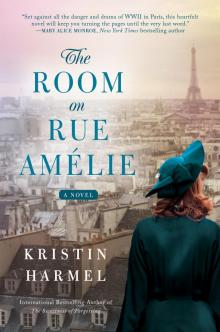 The Room on Rue Amélie
The Room on Rue Amélie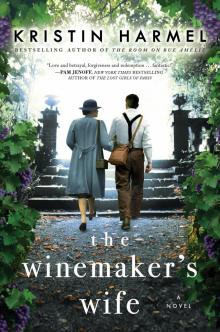 The Winemaker's Wife
The Winemaker's Wife The Forest of Vanishing Stars
The Forest of Vanishing Stars The Book of Lost Names
The Book of Lost Names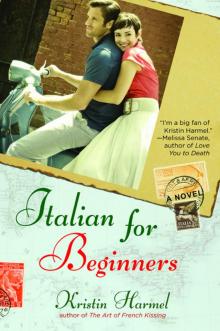 Italian for Beginners
Italian for Beginners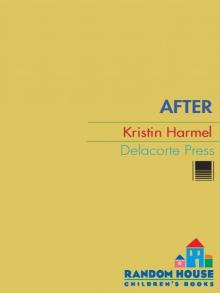 After
After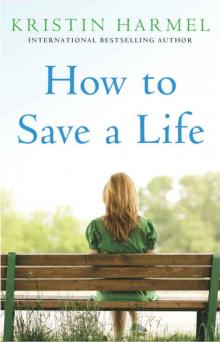 How to Save a Life
How to Save a Life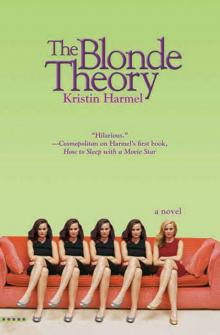 The Blonde Theory
The Blonde Theory The Sweetness of Forgetting
The Sweetness of Forgetting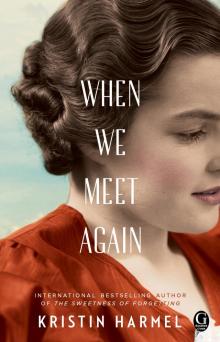 When We Meet Again
When We Meet Again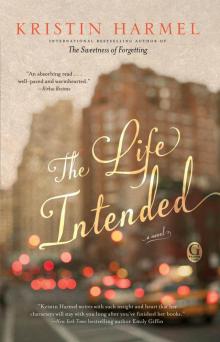 Life Intended (9781476754178)
Life Intended (9781476754178)